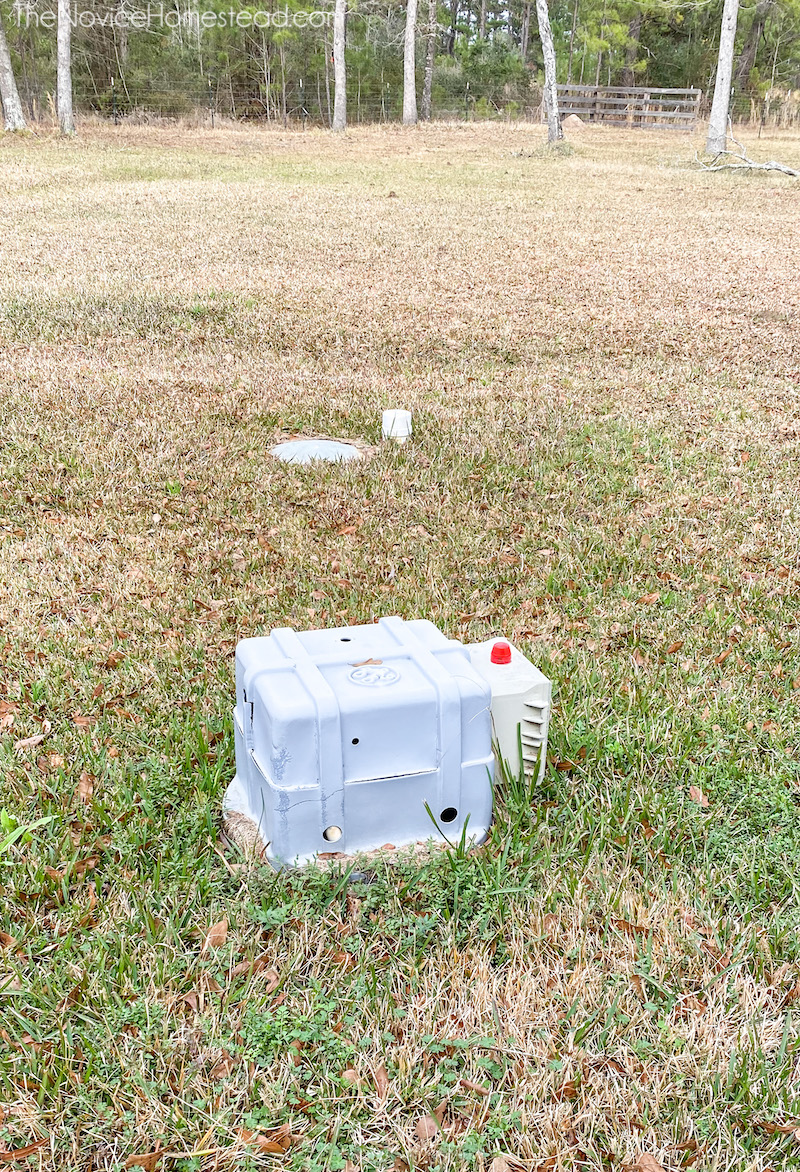If you’re considering buying a house with a septic system, it’s important to know a little bit about it first! Keep reading for our beginner’s guide to care for a septic system.

What is a Septic Tank?
If you live outside city limits or in an unincorporated area, chances are, your house will have a septic tank.
A septic tank is an underground tank and is part of a system to process wastewater. It is an alternative to a sewer system, and is generally used in areas where no sewer service is available.
How Does a Septic System Work?
When we first moved into our house, my husband and I had no idea how to take care of our septic system, aside from the basics. This was the first time either of us had ever had a septic tank!
And wouldn’t you know it, within a few weeks of living in our home, the septic alarm went off — even though we’d had the system inspected prior to moving in.
When our local septic service arrived that night, instead of just letting them do their thing, my husband and I asked them to show us how everything worked.
There are different types of systems, but they generally have the same basic function.
When you flush, wastewater flows into the tank. Once there, the solids settle to the bottom. This is also known as the “sludge.”
Over time, “good” bacteria in the tank break down the sludge, separating it into clean water that will eventually leave the tank and “scum” that floats on top. This scum doesn’t break down and eventually will need to be pumped out of the tank.
Once water has been separated, it is released from the tank into a leach field or a sprinkler system. There it will be filtered again by the soil as it soaks into the ground.

Your septic tank may also have an aerator (shown above) which pushes air into the system. Aerobic bacteria need oxygen to thrive and help them break down waste faster.
What are the Advantages of a Septic Tank?
Depending on where you live, you may or may not have a choice about whether you have septic or municipal sewer service.
Regardless, there are still quite a few benefits to a septic system that make it a worthwhile investment.
- Off-Grid — One of the main goals with homesteading is to be as self-reliant as possible. A septic tank fits right into that plan.
- No Monthly Bills — Say bye-bye to your sewage bills! Depending on where you live, city water and sewage can cost hundreds of dollars a month!
- Environmentally Friendly — Septic tanks are a self-contained wastewater treatment system. When properly installed and maintained, they don’t contaminate the water supply. Also, since the lines are in your yard only, less energy is required for processing, resulting in a lower environmental impact.
What Should You Not Put in a Septic Tank?
Anything but toilet paper!
There are a few things that can occasionally slip by, but overall, you want to limit what you flush to just toilet paper.
The more things that end up in the septic tank, the sooner you’ll need to pump it. Furthermore, certain chemicals and common household products can harm the good bacteria in your tank, so they won’t be able to do their job.
Many of these things really shouldn’t be put in a sewer either, but people generally do because it’s “not our problem” and we don’t have to worry about what we flush after the fact.
A septic tank, however, is a delicate ecosystem. The good news: if you care for your system, it is relatively low maintenance. And a well-maintained septic system can last decades!
Things that Should Only Sparingly Be Flushed or Rinsed Down the Drain
- Food — It’s inevitable the little bits of food will go down the kitchen drain, but overall you’ll want to avoid putting food down the sink, even if you have a disposal.
- Flushable wipes — These say they are septic safe, but they take longer to break down than toilet paper.
- Bleach — Small amounts of bleach generally won’t overpower the thousands of gallons of water in your tank. However, it is better not to do ALL of your cleaning or laundry on one day.
Things that Should Never Be Put in a Septic Tank
Do not flush or rinse any of these things down the drain, toilet, etc. if you have a septic tank.
- Paper towels
- Tampons or pads
- Diapers
- Baby wipes
- Coffee grounds
- Grease or fat from cooking
- Cigarette butts
- Drain cleaner
- Paint
- Anything non-biodegradable
Items that don’t break down easily (or ever) can clog the pipes or fill up the tank quickly.
Strong chemicals can kill the beneficial bacteria in your tank.
How Often Should You Pump a Septic Tank?
This will vary depending on your usage and how well you take care of your septic system. The more things that are added to the tank that the bacteria can’t break down, the more often it will need pumped.
Our septic company suggests pumping every three years — based on the condition of our system and our family’s usage. This is a good rule of thumb, but again, may be different for your setup. I know people who have gone much longer between pumps!
The thing to keep in mind is that not pumping when needed can lead to costly or yucky issues.
How Do You Know When to Pump?
As mentioned above, it’s a good idea to have your tank pumped every few years for maintenance. It is also a good idea to have the tank pumped before moving into a new home.
Signs of septic system problems:
- Strong odors outdoors and/or inside the house
- Slow draining or gurgling sounds from drains
- Trouble flushing toilets
- Sewage backup
Septic Tank Maintenance — What to Do to Keep it Running Well
When you keep up with septic maintenance, your system can last for 10, 20, 30 years or more!
- Take care with what you do and don’t flush (see our list above).
- Regularly inspect your septic system.
- Pump on a regular schedule, before there is a big problem.
- Keep the lids secure.
- Be mindful of your water use.
- Keep grass around lids and above-ground parts well-trimmed.
Should I Add Anything to My Septic Tank?
There are tons of products on the market that promise to keep your septic tank clean or add beneficial bacteria to the system.
Generally, your septic tank doesn’t need any additives.
I’ve seen a lot of mixed reviews on septic treatments. Many pros will tell you that they are unnecessary and simply a money-making scheme.
We occasionally use a treatment created by our septic care company. I don’t really know if it makes a difference, but we haven’t had any issues.
My Granny and Grandad lived on their rural home for about 2 decades. Granny said she added a box of Rid-X once a year and that was that.
If your system is working properly, I wouldn’t recommend messing with it. If you have any questions, call your local septic expert to be sure.
More Tips for Taking Care of Your Septic System
- Use eco-friendly cleaning, laundry, and dish products.
- Never drive over your tank or the drain field. A lawnmower should be fine, but larger vehicles can cause the tank and/or pipes to crack or break.
- Do not plant trees or large vegetation around the tank or in the drain field. Root growth can break pipes or even make their way into the tank.
- Always have a septic tank inspected by a professional inspector before moving into a new home. Your regular home inspection usually does not cover this, so you may need to hire a separate inspector.
It’s good to learn that you should look to get your septic tank pumped every three years. My wife and I are wanting to build and maintain our dream home. I’ll be sure that we should get the septic tank pumped every few years to maintain the house.
That’s a good idea to have it checked by a pro. That sounds safer to me. I’ll keep that in mind if I get a septic tank.
It’s good to learn that you should get your septic tank cleaned if you smell odors coming from it. My wife and I are wanting to deep clean our home. I’ll be sure to tell her that we should get the septic tank cleaned if odors are coming from it.
I can see how a business could really benefit from getting the right kind of septic tank in order to have a nicer area. Making sure that they can get some maintenance from a professional could allow them to be safer. I’ll be sure to tell her about how sewage backup, problems with flushing toilets, and draining that is really slow can be an indication that the tank needs to be pumped.
It’s great to learn that you can save hundreds of dollars a month when you maintain a septic tank. My wife and I are wanting to lower our monthly bills and we were wondering how we could save on our water bill each month. I’ll be sure to tell her that we should learn how to effectively maintain our septic tank.
Hi Stacey! Can people do the maintenance of septic system by themselves or is it important to ask for service?
I mean, with some online resource can we learn the basics of septic tank maintenance to save some income?
I always think it is good to learn how your system works. But I wouldn’t repair myself unless I really knew what I was doing.
It really helped when you elaborated on septic system issues and how to identify them on time. I visited my aunt’s house last weekend and noticed a bad and strong smell coming from her outside, so I’ll make sure she reads your post. Thanks for the advice on pumping a septic tank every few years.